Major Henry Charles David Marshall - Wallet 2 - Booklet 9 - Part 4
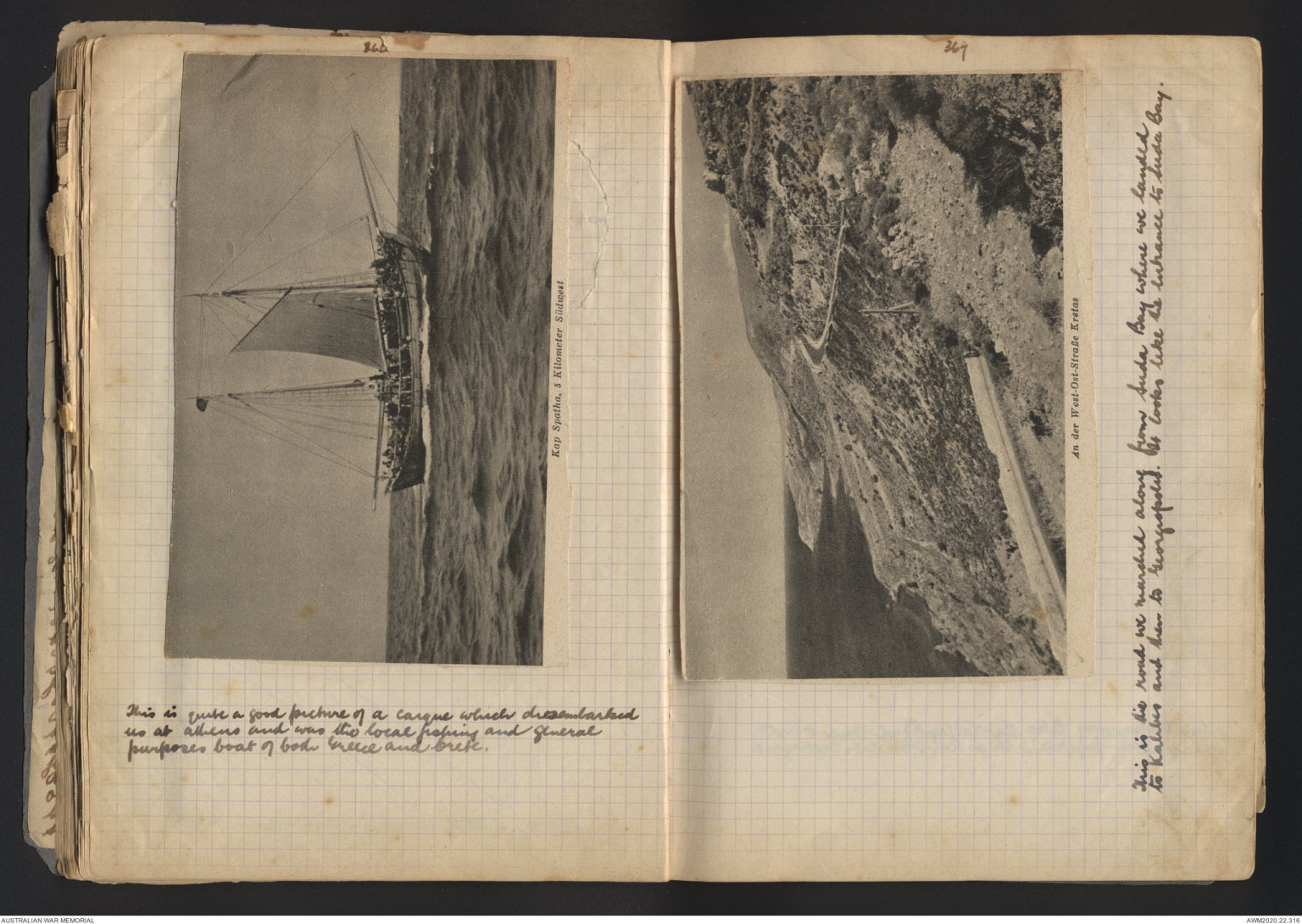
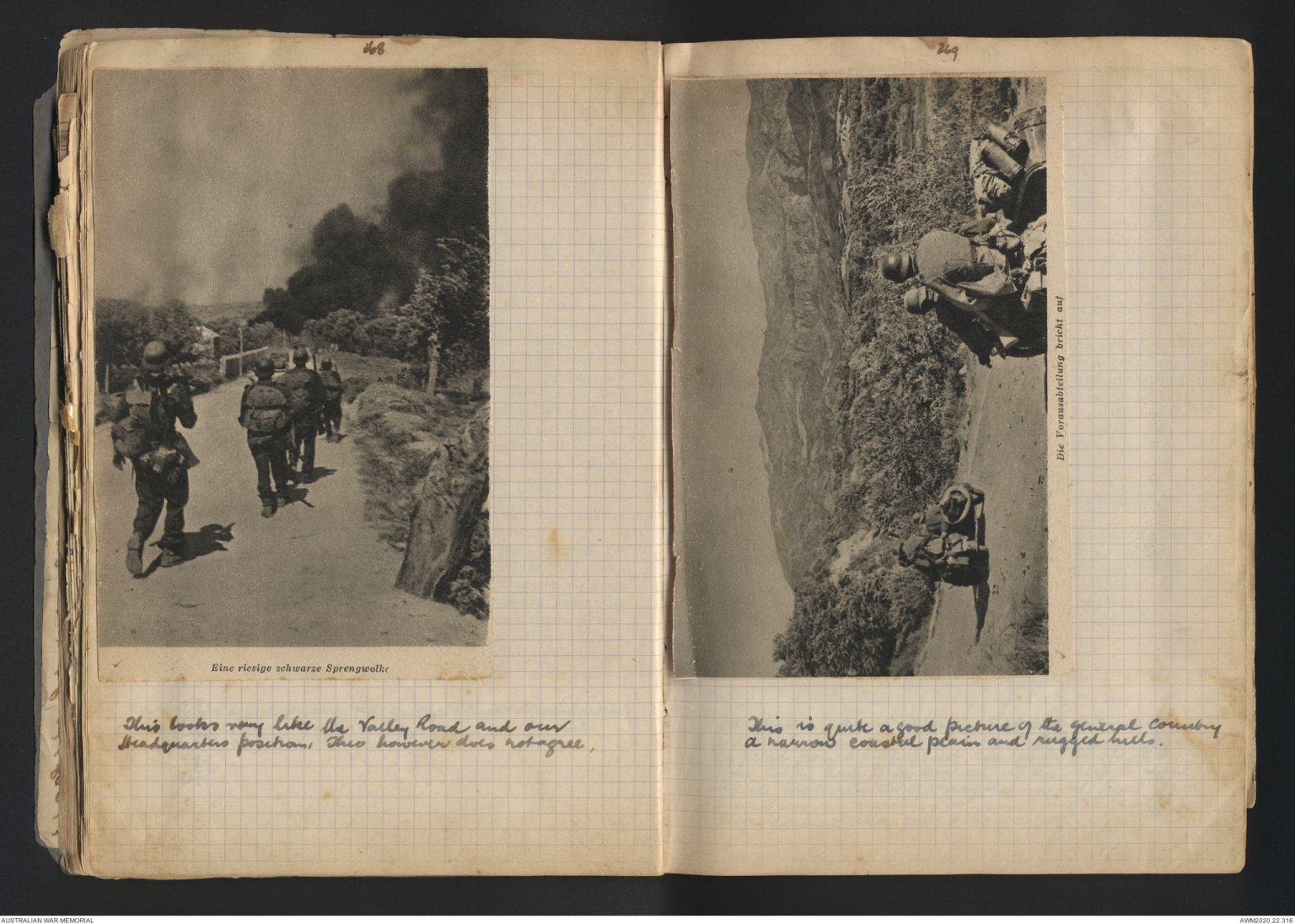
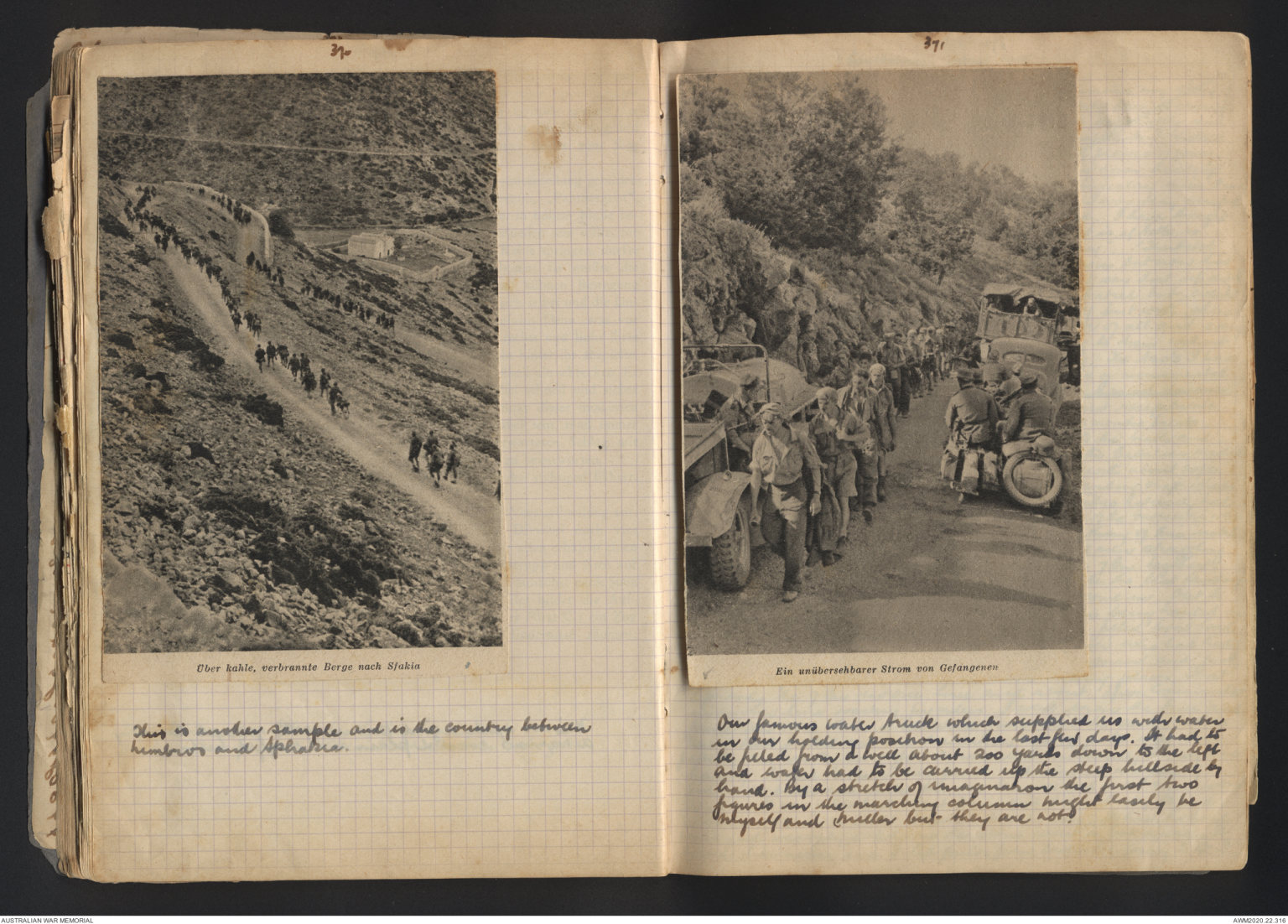
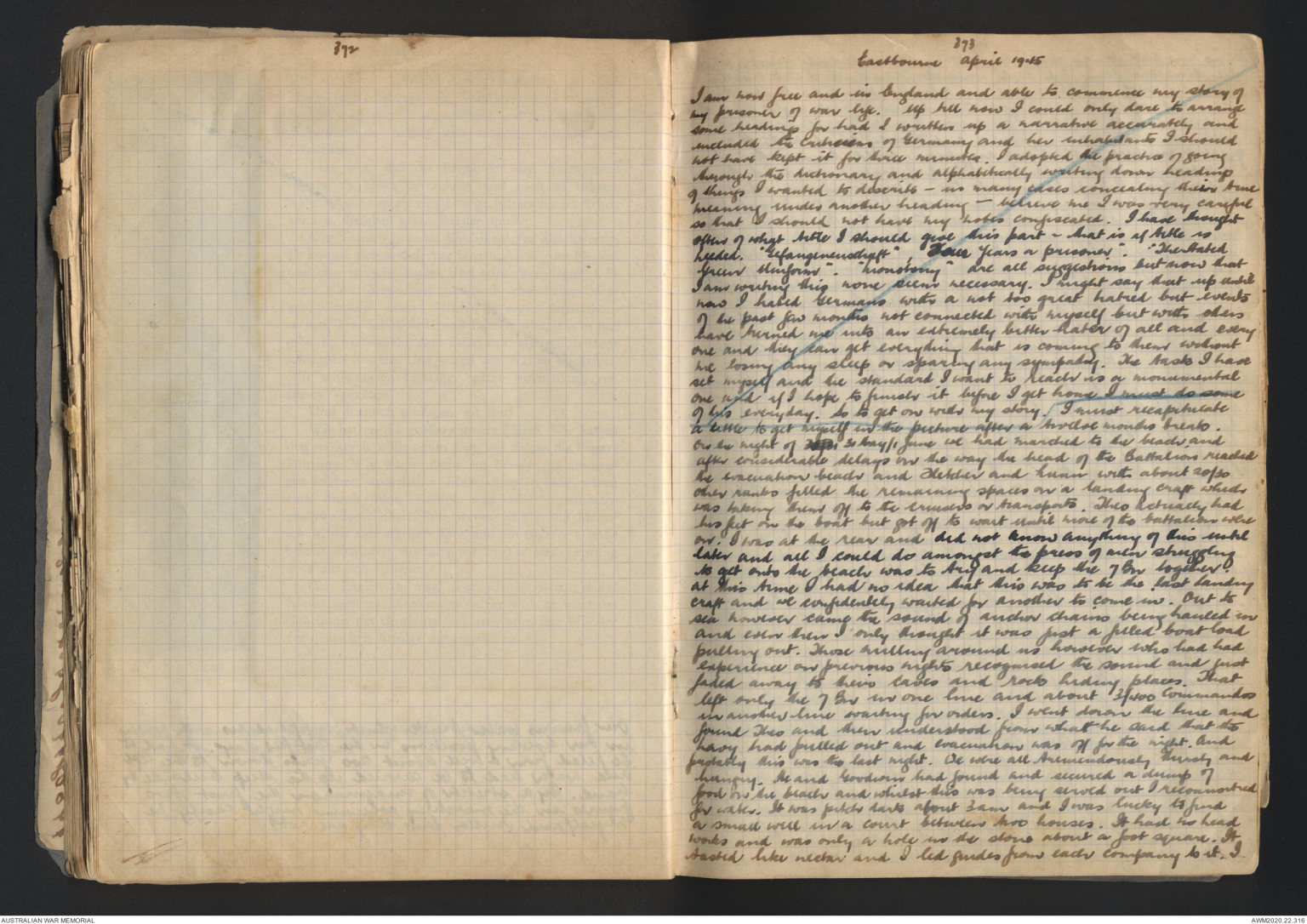
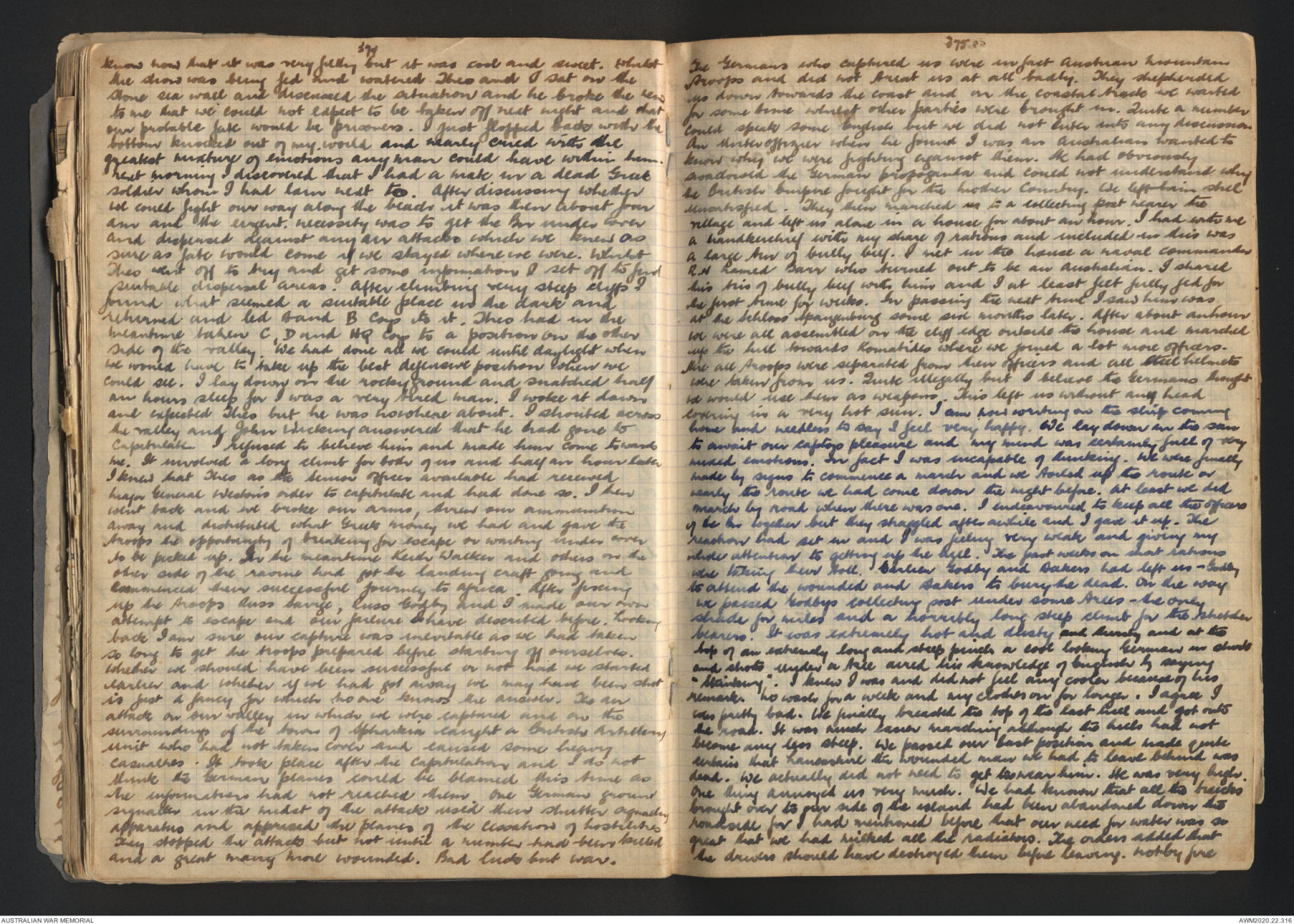
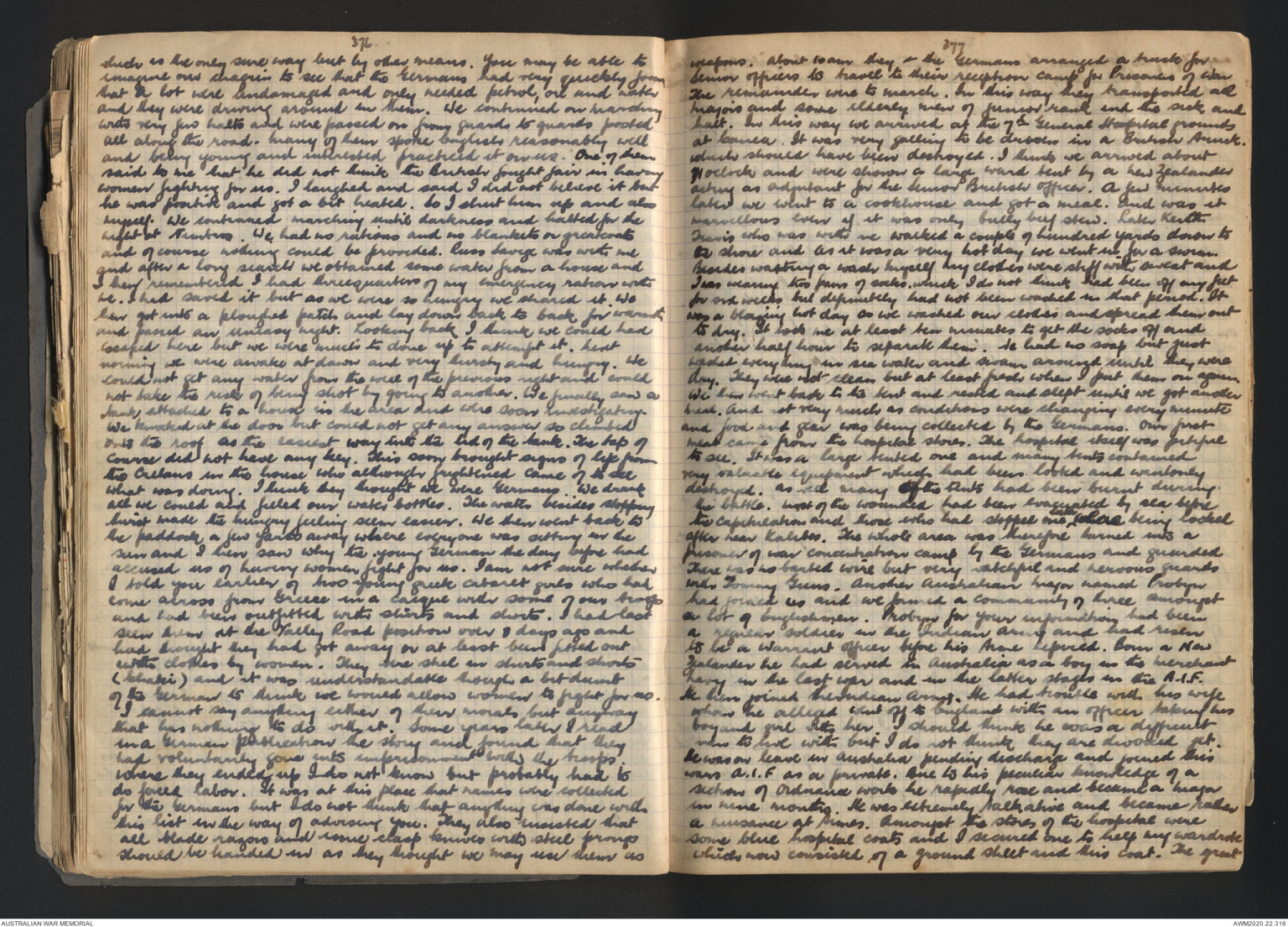
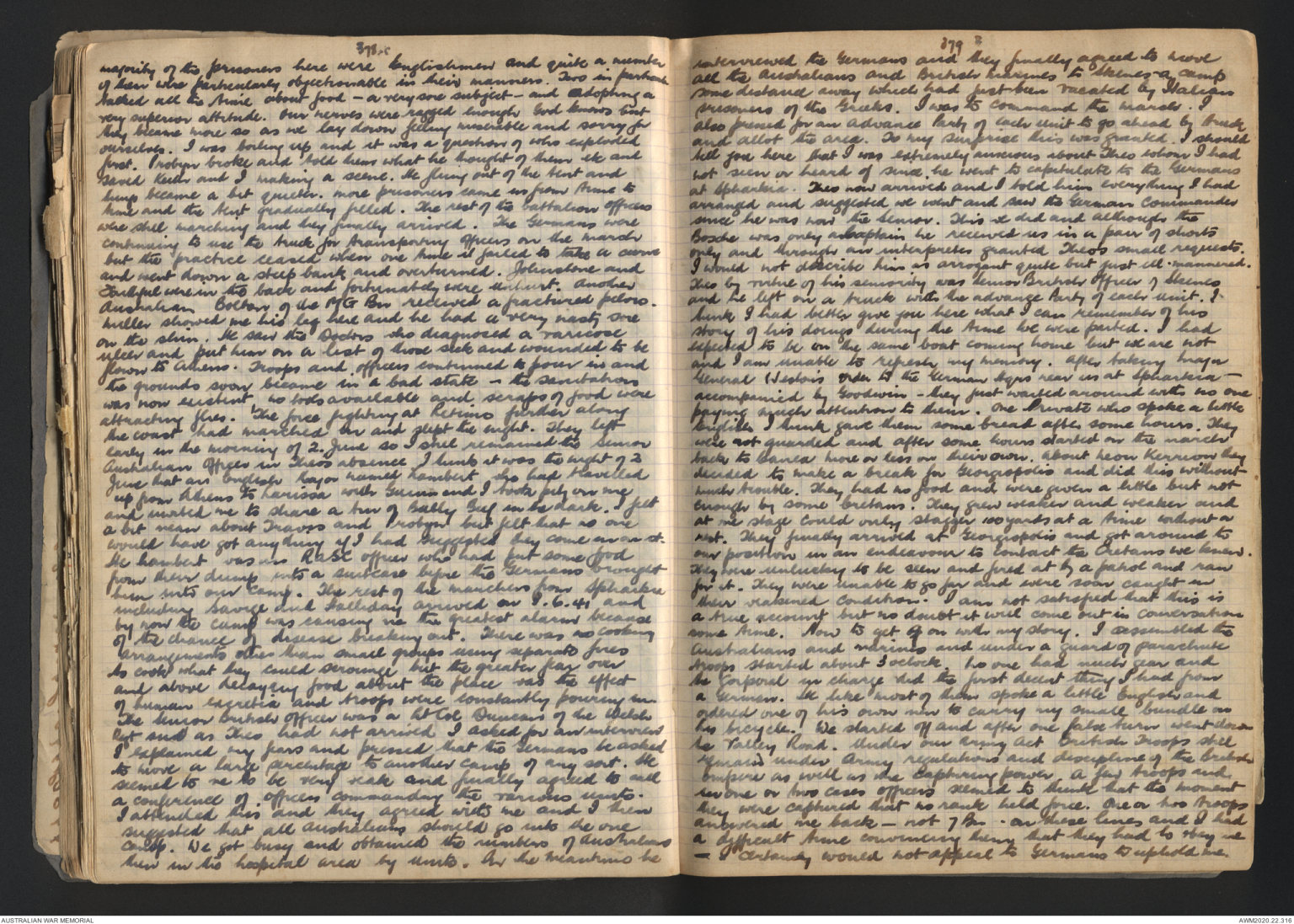
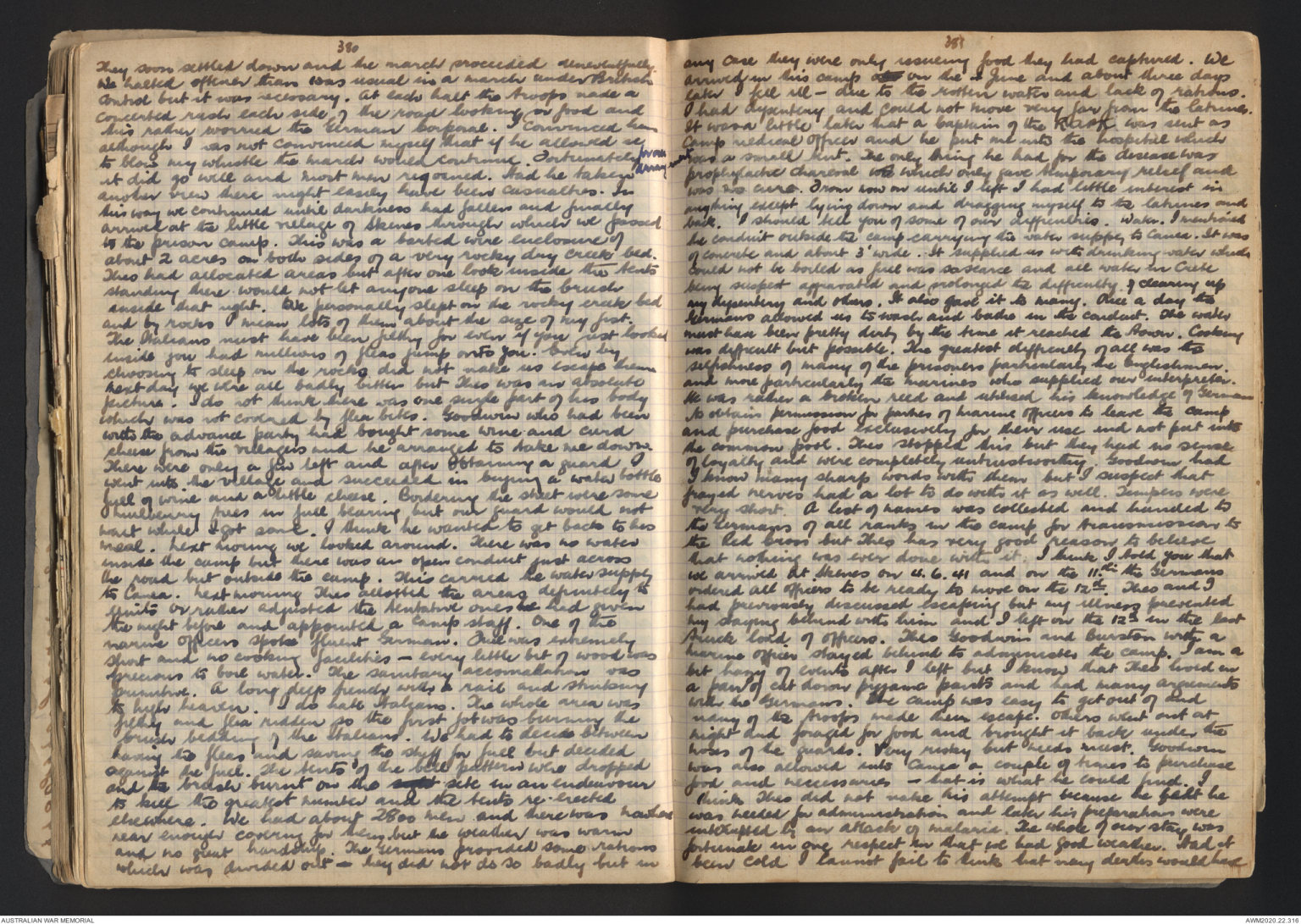
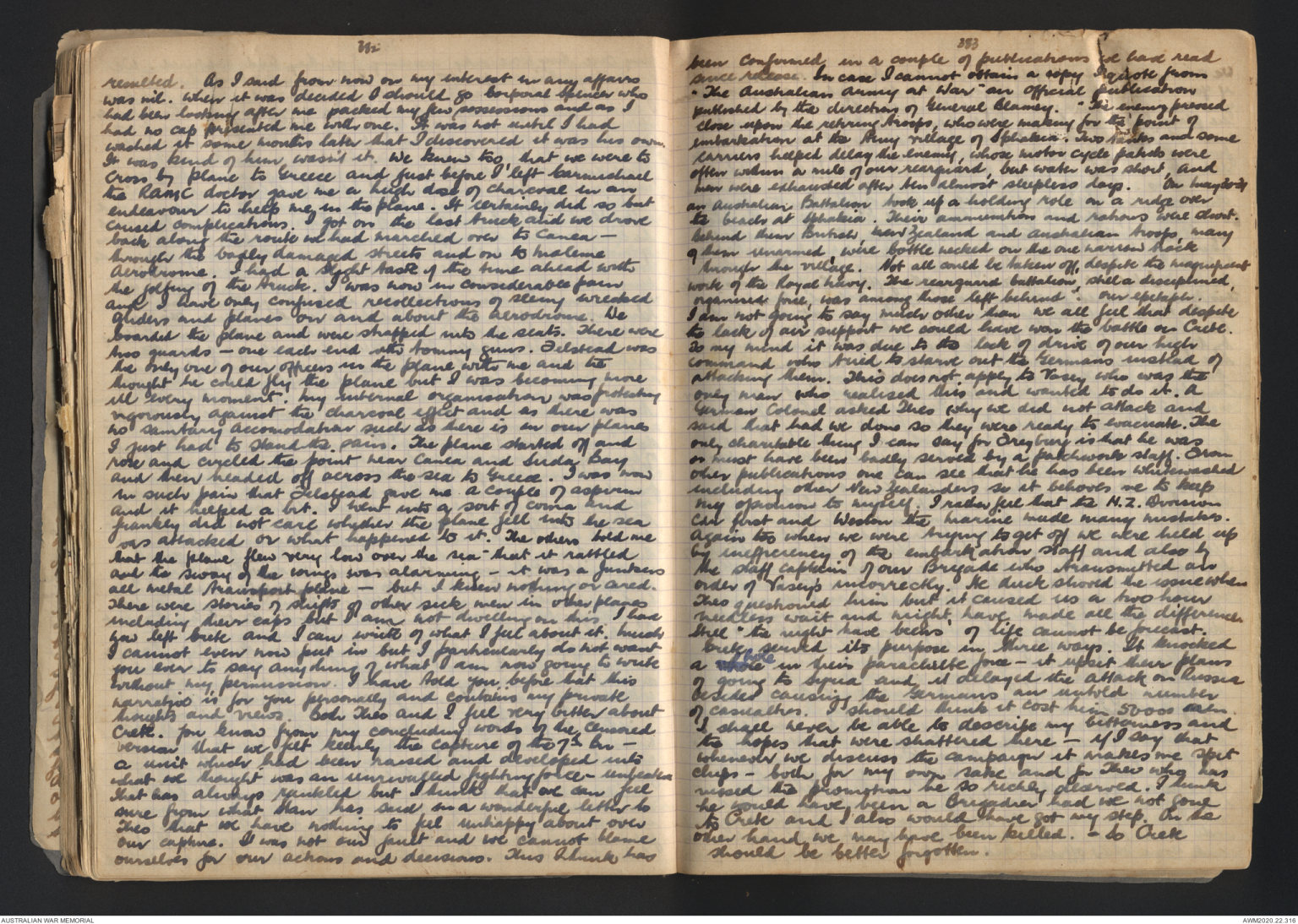
366
Photo - see original document
Kap Spatha, 5 Kilometer Sudwest
This is quite a good picture of a carque which disembarked
us at Athens and was the local fishing and general
purposes boat of both Greece and Crete.
367
Photo - see original document
An der West-Ost-StraBe Kretas
This is the road we marched along from Suda Bay where we landed
to Kalibes and then to Georgiopolis. It looks like the entrance to Suda Bay.
368
Photo - see original document
Eine riesige schwarze Sprengwolke
This looks very like the Valley Road and our
Headquarters position. This however does not agree,
369
Photo - see original document
Die Vorausabteilung bricht auf
This is quite a good picture of the general country
a narrow coastal plain and rugged hills.
370
Photo - see original document
Uber kahle, verbrannte Berge nach Sfakia
This is another sample and is the country between
Limbros and Sphakia.
371
Photo - see original document
Ein unubersehbarer Strom von Gefangenen
Our famous water truck which supplied us with water
in our holding position in the last few days. It had to
be filled from a well about 200 yards down to be left
and water had to be carried up the steep hillside by
hand. By a stretch of imagination the first two
figures in the marching column might easily be
myself and miller but they are not.
372
373
Eastbourne April 1945
I am now free and in England and able to commence my story of
my prisoner of war life. Up till now I could only dare to arrange
some headings for had I written up a narrative accurately and
included the custodians of Germany and her inhabitants I should
not have kept it for [[Svice?]] [[?]]. I adopted the practice of going
through the dictionary and alphabetically writing down headings
of things I wanted to describe - as many cases concealing their time
meaning under another heading - believe me I was very careful
so that I should not have my notes confiscated. I had thought
often of what little I should give this part - that is if title is
needed. "Gefangeneusdraft" , "Four Years a prisoner", "The Hated
Green Uniform", "Lion story" are all suggestions but now that
I am writing this none seem necessary. I might say that up until
now I hated German with a not too great hatred but event
of the past few months not connected with myself but with others
have turned me into an extremely bitter hater of all and every
one and they can get everything that is coming to them without
me losing any steep or sparing any sympathy. The task I have
set myself and the standard I want to reach is a monumental
one and if I hope to finish it before I get home l must do some
of this every day. So to get on with my story, I must recapitulate
a little to get myself in the picture after a [[?]] months break.
On the night of 3Apr 31 May/1 June we had marched to the beach, and
after considerable delays the way the head of the Battalions reached
the evacuation beach and Fletcher and Lunn with about 20/30
other ranks filled be remaining spaces on a landing craft which
was taking them off to the cruisers or transports. Theo actually had
his feet on the boat but got off to wait until more of the battalion were
on. I was at the rear and did not know anything of this until
later and all I could do amongst the press of men struggling
to get onto he beach was to try and keep the 7 Bn together.
At this time I had no idea that this was to be the last landing
craft and we confidently waited for another to come in. Out to
sea however came to sound of anchor chains being hauled in
and even then I only thought it was just a filled boat load
pulling out. Those mulling around us however who had had
experience on previous nights recognised to sound and just
faded away to their caves and rock hiding places. That
left only the 7 Bn in one line and about 3/400 Commandos
in another line waiting for orders. I went down the line and
found Theo and then understood from what he said that the
Navy had pulled out and evacuation was off for the night. And
probably this was to last night. We were all tremendously thirsty and
hungry. He and Goodwin had found and secured a dump of
food on the beach and whilst this was being served out I reconnoitred
for water. I was pitch dark about 3am and I was lucky to find
a small well in a court between two house. It had no head
works and was only a hole in the stone about a foot square. It
tasted like nectar and I led guides from each company to it. I
374
know how that it was very filthy but it was cool and sweet. Whilst
the show was being fed and watered Theo and I sat on the
stone sea wall and discussed the situation and he broke the news
to me that we could not expect to be taken off next night and that
our probable fate would be prisoner. I just flopped back with the
bottom knocked out of my world and nearly cried with the
greatest mixture of emotions any man could have within him.
Next morning I discovered that I had a mate in a dead [[Kraut?]]
soldier whom I had lain next to. After discussing whether
we could fight our way along the bends it was then about four
am and the urgent necessity was to get the Bn under cover
and dispensed against any air attacks which we knew as
sure as fate would come if we stayed where we were. Whilst
Theo went off to try and get some information I set off to find
suitable dispersal areas. After climbing very steep cliffs I
found what seemed a suitable place in the dark and
returned and led A and B Coys to it. Theo had in the
meantime taken C, D and HQ Coys to a position on do other
side of to valley. We had done all we could until daylight when
we would have to take up the best defensive position when we
could see. I lay down on be rocky ground and snatched half
an hours steep for I was a very tired man. I woke it dawn
and expected Theo but he was nowhere about. I shouted across
the valley and John Wicking answered that he had gone to
Capitulate. I refused to believe him and made come towards
me. It involved a long climb for both of us and half an hour later
I knew that Theo as the Senior Officer available had received
Major General Weston's order to capitulate and had done so. I then
went back and we broke our arms, threw on ammunition
away and distributed what Greek money we had and gave the
troops the opportunity of breaking for escape or waiting under cover
to be picked up. In the meantime Keith Walker and others on the
other side of the ravine had got the landing craft going and
commenced their successful journey to Africa. After fixing
up to troops Russ Savage, Russ Godley and I made our own
attempt t scape and our failure I have described before. Looking
back I am sure our capture was inevitable as we had taken
so long to get he troops prepared before starting off ourselves.
Whether we should have been successful or not had we started
earlier and whether if we had got away we may have been shot
is just a fancy for which no one knows the answer. The air
attack on our valley in which we were captured and on the
surroundings of the town of Sphakia caught a British Artillery
Unit who had not taken cover and caused some heavy
casualties. It took place after the capitulation and I do not
think the German planes could be blamed this time as
the information had not reached them. One German ground
signaller in the midst of the attack used their shutter [[?]]
apparatus and apprised the planes of the location of hostilities
They stopped be attack but not until a number had been killed
and a great many more wounded. Bad luck but war.
375
The Germans who captured us were in fact Austrian Mountain
Troops and did not treat us at all badly. They shepherded
us down towards the coast and on the coastal track we waited
for some time whilst other parties were brought in. Quite a number
could speak some English but we did not enter into any discussion.
An [[Unter Offizier?]] when he found I was an Australian wanted to
know why we were fighting against them. He had obviously
swallowed the German propaganda and could not understand why
the British Empire fought for the Mother Country. We left him still
unsatisfied. They then marched us to a collecting post nearer to
village and left us alone in a house for about an hour. I had with me
a handkerchief with my share of rations and included in this was
a large tin of bully beef. I met in the house a naval commander
R.N named Barr who turned out to be an Australian. I shared
his tin of bully beef with him and I at least felt fully fed for
the first time for weeks. In passing the next time I saw him was
at the Schloss Spangenburg some six months later. After about an hour
we were all assembled on the cliff edge outside the house and marched
up to hill towards Komatides where we joined a lot more officers.
Here all troops were separated from the officers and all steel helmets
were taken from us. Quite Illegally but I believe the Germans thought
it would use them as weapons, This left us without any head
covering in a very hot sun. I am now writing on the ship coming
home and needless to say I feel very happy. We lay down in to sun
to await our captors pleasure and my mind was certainly full of very
mixed emotions. In fact I was incapable of thinking. We were finally
made by signs to commence a march and we toiled up to route or
nearly to route we had come down the night before. At least we did
march by road when there was one. I endeavoured to keep all the officers
of of the Bn together but they straggled after awhile and I gave it up. The
reaction had set in and I was feeling very weak and giving my
whole attention to getting up the hill. The past weeks on short rations
were taking their toll. Carleen Godley and Dakers had left us - Godley
to attend the wounded and Dakers to bury be dead. On the way
we passed Godleys collecting post under some trees - the only
shade for miles and a horribly long steep climb for the stretcher
bearers. It was extremely hot and dusty and [[?]] and at the
top of an extremely long and steep pinch a cool looking German in shirts
and shorts under a tree aired his knowledge of English by saying
"Stainbury". I knew I was and did not feel any cooler because of his
remark. No wash for a week and my clothes on for longer. I agree I
was pretty bad. We finally breached the top of to last hill and got onto
the road. It was much easier marching although the hills had not
become any less steep. We passed our last position and made quite
certain that Lancashire the wounded man we had to leave behind was
dead. We actually did not need to get too near him. He was very high.
One thing annoyed us very much. We had known that all the trucks
brought over to our side of the island had been abandoned down the
roadside for I had mentioned before that our need for water was so
great that we had milked all the radiators. The orders added that
the drivers should have destroyed them before leaving. Not by fire
376
which is the only sure way but by other means. You may be able to
imagine our chagrin to see that the Germans had very quickly found
that a lot were undamaged and only needed petrol, oil and water
and they were driving around in them. We continued on marching
with very few halt and were passed on from guards to guards posted
all along the road. Many of them spoke English reasonably well
and bely young and interested practiced it on us. One of them
said to me that he did not think the British fought fair in having
women fighting for us. I laughed and said I did not believe it but
he was positive and got a set heated. So I shut him up and also
myself. We continued marching until darkness and halted for the
nigh at Nimbus. We had no rations and no blankets or greatcoats
and of course nothing could be provided. Russ Savige was with me
and after a long search we obtained some water from a house and
I then remembered I had three quarters of my emergency ration with
me. I had saved it but as we were so hungry we shared it. We
then got into a ploughed patch and lay down back to back for warmth
and passed an uneasy night. Looking back I think we could have
couped here but we were much to done up to attempt it. Next
morning we were awake at dawn and very thirsty and hungry. We
could not get any water from the well of the previous night and could
not take the risk of being shot by going to another. We finally saw a
tank attached to a house in the area and were soon investigating.
We knocked at the door but could not get any answer so climbed
over the roof as the easiest way into the lid of the tank. The top of
course did not have any key. This soon brought signs of life from
the Cretans in the house who although frightened came of to see
what was doing. I think they thought we were Germans. We drank
all we could and filled our water bottles. The water besides stopping
thirst made the hungry feeling seem easier. We then went back to
the paddock a few [[?]] away where everyone was sitting in the
sun and I then saw why to the young German the day before had
accused us of having women fight for us. I am not sure whether
I told you earlier of two young greek cabaret girls who had
come across from Greece in a casque with some of our troops
and had been outfitted with shirts and shorts. I had last
seen them at the Valley Road position over 8 days ago and
had thought they had got away or at least been fitted out
with clothes by women. They were still in shirts and shorts
(khaki) and it was understandable though a bit dumb
of the German to think we would allow women to fight for us
I cannot say anything either of their morals but anyway
that has nothing to do with it. Some years later I read
in a Germen publication the story and found that they
had voluntarily gone into imprisonment with the troops.
Where they ended up I do not know but probably had to
do forced labor. It was at this place that names were collected
for the Germans but I do not think that anything was done with
this list in the way of advising you. They also insisted that
all blade razors and some clasp knives with steel prongs
should be handed in as they thought we may use them as
377
weapons. About 10 am they - the Germans arranged a truck for
Senior Officers to travel to their reception camp for Prisoners of War
The remainder were to march. In his way they transported all
Majors and some elderly men of junior rank and the sick and
lieut. In this way we arrived at the 7th General Hospital grounds
at Canea. It was very galling to be [[?]] in a British truck.
which should have been destroyed. I think we arrived about
11 oclock and were shown a large ward tent by a New Zealander
acting as adjutant for the Senior British Officer. A few minutes
later we went to a cookhouse and got a meal. And was it
marvellous even if it was only bully beef stew. Later Keith
Travis who was with me walked a couple of hundred yards down to
the shore and as it was a very bot day we went in for a swim.
Besides wasting a wash myself my clothes were stiff with sweat and
I was wearing two pairs of socks. which I do not think had been off my feet
for six weeks but definitely had not been washed in that period. It
was a blazing hot day so we washed our clothes and spread them out
to dry. It took me at least ten minutes to get the socks off and
another half hour to separate them. We had no soap but just
washed everything in sea water and swam around until they were
dry. They were not clean but at least fresh when I put them on again.
We then went bad to the tent and rested and slept until we got another
meal. And not very much as conditions were changing every minute
and food and gear was being collected by the Germans. Our first
meat came from the hospital stores. The hospital itself was pitiful
to see. It was a large tented one and many tents contained
very valuable equipment which had been looted and wantonly
destroyed. As well many of the tents had been burnt during
the battle. Most of the wounded had been evacuated by sea before
the Capitulation and those who had stopped one ^later were being looked
after near Kalibes. The whole area was therefore turned into a
prisoner of war concentration camp by the Germans and guarded
There was no barbed wire but very watchful and nervous guards
with Tommy Guns. Another Australian Major named Probyn
had joined us and we formed a Community of three amongst
a lot of Englishmen. Probyn for your information had been
a regular soldier in the Indian Army and had risen
to be a Warrant Officer before his time expired. Bonn a New
Zealander he had served in Australia as a boy in the Merchant
Navy in be last war and in the letter stages in the A.I.F.
He then joined the Indian Army. He had trouble with his wife
when he alleged went off to England with an officer taking his
boy and girl with her. I should think he was a difficult
man to live with but I do not think they are divorced yet.
He was on leave in Australia pending discharge and joined this
wars A.I.F as a private. Due to his peculiar knowledge of a
section of ordinance work be rapidly rose and became a Major
in nine months. He was extremely talkative and became rather
a nuisance at times. Amongst the stores of the hospital were
some blue hospital coats and I secured one to help my wardrobe
which now consisted of a ground sheet and this cost. The great
378
majority of the prisoners here were Englishmen and quite a number
of them were particularly objectionable in heir manners. Two in particular
talked all the time about food - a very sore subject - and adopting a
very superior attitude. Our nerves we ragged enough God knows but
they became more so as we lay down feeling miserable and sorry for
ourselves. I was boiling up and it was a question of who exploded
first. Probyn broke and told him what he thought of them etc and
saved Keith and I making a scene. He flung out of the tent and
things became a bit quieter. more prisoners came in from [[?]] to
home and to tent gradually filled. The rest of the battalion officers
were still marching and they finally arrived. The Germans were
continuing to use the truck for transporting Officers on the march
but the practice ceased when one time it failed to take.
and went down a steep bank and overturned. Johnstone and
Doubtful were in the back and fortunately were unhurt. Another
Australian Bolton of the MG Bn received a fractured pelvis.
Miller showed we his leg here and he had a very next sore
on to skin. He saw this Doctor who diagnosed a varicose
ulcer and put him on a list of those sick and wounded to be
flown to Athens. Troops and officers continued to pour in and
the grounds soon became in a bad state - the sanitations
was now existent so beds available and scraps of food were
attracting flies. The force fighting at Retimo further along
the coast had marched on and slept the night. They left
early in the morning of 2. June so I still remained the Senior
Australian Officer in Theos absence. I think it was the might of 2
June that an English Major named Lambert, who had travelled
up from Athens to Larissa with Guinn and I took pity on me
and invited me to share a tin of Bully Beef in the dark. I felt
a bit mean about Travis and Probyn but felt that no one
would have got anything if I had suggested by come around.
Lte Lambert was an RASC officer who had put some food
from their dump into a suitcase before the Germans brought
beer into our camp. The rest of the marchers from Sphaiku
including Savige and Halliday arrived on 8.6.41 and
by now the came was causing us the greatest alarm because
of the chance of disease breaking out. There was no cooking
arrangements other than small groups using separate fires
to cook what they could scrounge but the greater fear over
and above decaying food about the place was the effect
of human excretia and troop were constantly pouring in
The Senior British Officer was a Lt Col Duncan of he Welsh
Regt and as Theo had not arrived I asked for an interview
I explained my fears and pressed that the Germans be asked
to move a large percentage to another camp of any sort. He
seemed to me to be very weak and finally agreed to ask
a conference of officers commanding the various units.
I attended this and they agreed with me and I then
suggested that all Australians should go into the one
camp. We got busy and obtained the numbers of Australians
then in the hospital area by units. In the meantime he
379
interviewed the Germans and they finally agreed to move
all the Australians and British marines to Skines-a camp
some distance away which had just been vacated by Italians
prisoners of the Greeks. I was to command the march. I
also pressed for an advance Party of each unit to go ahead by truck
and allot the area. To my surprise this was granted. I should
tell you here that I was extremely anxious about Theo whom I had
not seen or heard of since, he went to capitulate to the Germans
at Spharkia. Theo now arrived and I told him everything I had
arranged and suggested we went and saw the German commander
since he was now the Senior. This it did and although the
Bosche was only a Captain he received us in a pair of shorts
only and through an interpreter granted Theos small requests.
I would not describe him as arrogant quite but just ill mannered.
Theo by virtue of his seniority was Senior British Officer of Skines
and he left on a truck with the advance Party of each unit. I
Think I had better give you here what I can remember of his
story of his doings during the time we were parted. I had
expected to be on the same boat coming home but we are not
and I am unable to refresh my memory. After taking Major
General Weston's order to the German Hqrs near us at Spharkia -
accompanied by Goodwin - they just waited around with no one
paying much attention to them. One Private who spoke a little
English I think gave them some bread after some hours. They
were not guarded and after some hours started on the march
back to Canea more or less on their own. About near Kerrion they
decided to make a break for Georgiopolis and did this without
much trouble. They had no food and were given a little but not
enough by some Cretans. They grew weaker and weaker and
at one stage could only stagger 100 yards at a time without a
rest. They finally arrived at Georgiopolis and got around to
our position in an endeavour to contact the Cretans we knew.
They were unlucky to be seen and fired at by a patrol and ran
for it. They were unable to go far and were soon caught in
their [[?]] condition. I am not satisfied that this is
a true account but so doubt it will come out in conversation
some time. Now to get of on with my story. I assembled the
Australians and marines and under a guard of parachute
troops started about 3 oclock. No one had much gear and
the Corporal in charge did the first decent thing I had from
a German. He like most of them spoke a little English and
ordered one of his own men to carry my small bundle on
his bicycle. We started of and after one false turn went down
the Valley Road. Under our Army Act British Troops still
remain under Army regulations and discipline of the British
Empire as well as the capturing power. A few troops and
in one or two cases officers seemed to think that the moment
they were captured that no rank held force. One or two troops
answered me back – not 7 Bn. on these lines and I had
a difficult time convincing them that they had to obey me
Certainly would not appeal to Germans to uphold me.
380
They soon settled down and the march proceeded uneventfully
We halted oftener than was usual in a march under British
Control but it was necessary. At each halt the troops made a
concerted rush each side of the road looking for food and
this rather worried the German Corporal. I convinced him
although I was not convinced myself that if he allowed me
to blow my whistle the march would continue. Interestingly [[parade array went]]
it did go well and most men rejoined. Had he taken
another view there might easily have been casualties. In
his was we continued until darkness had fallen and finally
arrived at the little village of Skenes through which we passed
to the prison camp. This was a barbed were enclosure of
about 2 acres on both sides of a very rocky dry creek bed.
Theo had allocated areas but after one look inside the tents
standing there would not let anyone sleep on the brush
inside that night. We personally slept on the rocky creek bed
and by rocks I mean lots of them about the size of my fist.
The Italians must have been filthy for even if you just looked
inside you had millions of fleas jump onto you. Even by
choosing to steep on the rocks did not make us escape them
Next day we were all badly bitten but Theo was as absolute
picture. I do not think there was one single part of his body
which was not covered by flea bites. Goodwin who had been
with the advance party had bought some wine and curd
cheese from the villages and he arranged to take me down.
There were only a few left and after Obtaining a guard I
went into the village and succeeded in buying a water bottle
full of wine and a little cheese. Bordering the street were some
mulberry trees in will bearing but our guard would not
react while I dot some. I think he wanted to get back to his
meal. Next morning we looked around. There was no water
inside the camp but here was an open conduit just across
the road but outside the camp. This carried the water supply
to Canea. Next morning Theo allotted the area definitely to
units or rather adjusted the tentative ones he had given
the night before and appointed a camp staff. One of the
marine officers spoke fluent German. Fuel was extremely
short and no cooking facilities - every little bit of wood was
precious to boil water. The sanitary accomodation was
primitive. A long deep trench with to rail and stinking
to high heaven. I do hate Italians. The whole area was
filthy and flea ridden so the first job was burning the
brush bedding of the Italians. We had to decide between
having the fleas and saving the stuff for fuel but decided
against the fuel. The tents of the bell pattern who dropped
and the brush burnt on the sight site in an endeavour
to kill the greatest number and the tents re-erected
elsewhere. We had about 2800 men and there was nowhere
near enough covering for them but the weather was warm
and no great hardship. The Germans provided some rations
which was divided out - they did not do so badly but in
381
any case they were only issuing food they had captured. We
arrived in this camp at on the 2 June and about three days
later I fell ill - due to the rotten water and lack of rations.
I had dysentery and could not move very far from the latrines.
It was a little later that a Captain of the RAAF was sent as
Camp medical officer and he put me into the hospital which
was a small tent. The only thing he had for the disease was
prophylactic charcoal wid which only gave temporary relief and
was no cure. From now on until I left I had little interest in
anything except lying down and dragging myself to be latrines and
back. I should tell you of some of our difficulties. Water. I mentioned
the conduit outside the camp carrying the water supply to Canea. It was
of concrete and about 3' wide. It supplied us with drinking water which
could not be boiled as fuel was so scarce and all water in Crete
being suspect aggravated and prolonged the difficulty If cleaning up
any Boysenbery and others. I also gave it to many. Once a day the
Germans allowed us to wash and bathe in to conduit. The water
must have been pretty dirty by the time it reached the town. Cooking
was difficult but possible. The greatest difficulty of all was the
selfishness of many of the prisoners particularly the Englishmen.
and more particularly the marines who supplied our interpreter.
He was rather a broken reed and utilised his knowledge of German
to obtain permission for parties of marine officers to leave the camp
and purchase food exclusively for their use end not put into
the common pool. Theo stopped this but they had no sense
of loyally and were completely untrustworthy. Goodwin had
I know many sharp words with them but I suspect that
frayed nerves had a lot to do with it as well. Tempers were
very short. A list of names was collected and handed to
the Germans of all ranks in the camp for transmission to
the Red Cross but Theo has very good reason to believe
that nothing was ever done with it. I think I told you that
we arrived at Skenes on 4.6.41 and on the 11th the Germans
ordered all officers to be ready to move on the 12th. Theo and I
had previously discussed escaping but my illness prevented
my staying behind into him and I left on the 12th in the last
truck load of officers. Theo Goodwin and Burston with a
marine officer stayed behind to administer the camp. I am a
bit hazy of events after I left but I know that Theo lived in
a pair of cut down pyjama pants and had many arguments
with the Germans. The camp was easy to get out of and
many of the troops made their escape. Others went out at
night and foraged for food and brought it back under the
noses of the guards. Very risky but needs must. Goodwin
was also allowed into Canea a couple of times to purchase
food and necessities - but is what he could find. I
think Theo did not make his attempt because he felt he
was needed for administration and later his preparations were
interrupted by an attack of malaria. The whole of our stay was
fortunate in one respect in that we had good weather. Had it
been cold I cannot fail to think that many deaths would have
382
resulted. As I said from now on my interest in any affairs
was nil. When it was decided I should go Corporal Spencer who
had been looking after me packed my few possessions and as I
had no cap presented me with one. It was not until I had
washed it some months later that I discovered it was his own.
It was kind of him wasn't it. We knew too, that we were to
cross by plane to Greece and just before I left Carmichael
the RAMC doctor gave me a high dose of charcoal in a
endeavour to help me in to plane. It certainly did so but
caused complications. I got on the last truck and we drove
back along the route we had marched over to Canea -
through the badly damaged streets and on to Maleme
Aerodrome. I had a slight taste of the time ahead with
the jolting of the truck. I was now in considerable pain
and I have only confused recollections of seeing wrecked
gliders and planes on and about to aerodrome. We
boarded to plane and were stuffed into the seats. There were
two guards - one each end with tommy guns. Felstead was
the only one of our officers in the plane with me and he
thought he could fly the plane but I was becoming more
ill every moment. My internal organisation was protesting
vigorously against the charcoal effect and as there was
no sanitary accomodation such as there is in our planes
I just had to stand the pain. The plane started off and
rose and circled the point near Canea and Suda Bay
and then headed off across the sea to Greece. I was now
in such pain that Felstead gave me a couple of aspirin
and it helped a bit. I went into a sort of coma and
frankly did not care whether the plane fell into the sea
was attacked or what happened to it. The others told me
that the plane flew very low over the sea that it rattled
and the sway of be wings was alarming - it was a Junkers
all metal transport plane - but I knew nothing moved.
There were stories of shifts of other sick men in other planes
including their caps but I am not dwelling on this. I have
now left Crete and I can write of what I feel about it. Much
I cannot even now put in but I particularly do not want
you ever to say anything of what I am now going to write
Without my permission. I have told you before that this
narrative is for you personally and contains my private
thoughts and views. Both Theo and I feel very better about
Crete. You know from my concluding words to the censored
version that we felt keenly the capture of to 7th Bn -
a unit which had been raised and developed into
what we thought was an unrivalled fighting force - unbeaten.
That has always rankled but I think that one can feel
sure from what Stan has said is a wonderful letter to
Theo that we have nothing to feel unhappy about over
our capture. It was not our fault and we cannot blame
ourselves for our actions and decision. This think has
383
been confirmed in a couple of publications we had read
snice release. In case I cannot obtain a copy I quote from
"The Australian Army at War" an official publication
published by the director of General Blamey. "The enemy pressed
close upon the returning troops, who were making for the point of
embarkation at the Army village of Sphakia. Two tanks and some
carriers helped delay the enemy, whose motor cycle patrols were
often within a mile of our rearguard, but water was short, and
men were exhausted after ten almost sleepless days. On [[Mayday?]]
an Australian Battalion took up a holding role on a ridge over
the beach at Sphakia. Their ammunition and rations were [[?]].
behind them British New Zealand and Australian troops, many
of them unarmed, were bottle necked on the one narrow track
through the village. Not all could be taken off, despite the magnificent
work of the Royal Navy. The rearguard battalion, still a disciplined,
organised force, was among those left behind". Our epitaph.
I am not going to say much other than we all feel that despite
the lack of air support we could have won the battle on Crete.
To my mind it was due to the lack of drive of our high
command who tried to starve out to Germans instead of
attacking them. This does not apply to Vasey who was the
only man who realised this and wanted to do it. A
German Colonel asked Theo why we did not allack and
said that had we done so they were ready to evacuate. The
only charitable thing I can say for Freyburg is that he was
or must have been badly served by a patchwork staff. From
other publications one can see that he has been whitewashed
including other New Zealanders so it behoves me to keep
my opinion to myself. I rather feel that the N.Z. Division
Cdr first and Weston the Marine made many mistakes.
Again too when we were trying to get off we were held up
by inefficiency of the embarkation staff and also by
the staff Captain of our Brigade who transmitted an
order of Vasey's incorrectly. He duck shoved the issue when
Theo questioned him but it caused us a two hour
needless wait and might have made all the difference.
Still the night have beens of life cannot be forecast.
Crete served its purpose in three ways. It knocked
a whole hole in their parachute force - it upset their plans
of going to Syria and it delayed the attack on Russia
Besides causing the Germans an untold number
of casualties. I should think it cost him 50000 men.
I shall never be able to describe my bitterness and
the hopes that were shattered there - if I say that
whenever we discuss the campaign it makes me spit
chips- both for my own sake and for Theo who has
missed the promotion he so richly deserved. I think
he could have been a Brigadier had we not gone
to Crete and I also would have got my step. On the
other hand we may have been killed. - So Crete
should be better forgotten.
 Sam scott
Sam scottThis transcription item is now locked to you for editing. To release the lock either Save your changes or Cancel.
This lock will be automatically released after 60 minutes of inactivity.